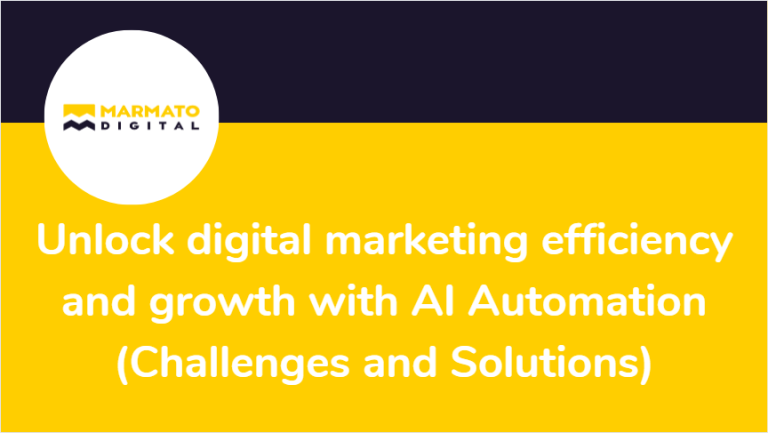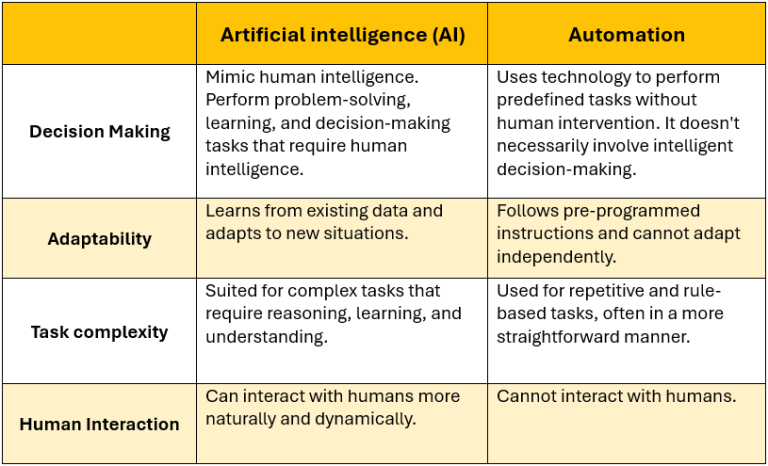Artificial intelligence (AI) revolutionizes problem-solving and decision-making processes, enhancing productivity and resource utilization. Whereas Automation replaces manual tasks with automated processes, helping businesses streamline operations, reduce errors, and achieve higher levels of accuracy. Combined, AI automation can analyze vast amounts of data, make data-driven decisions, and perform repetitive tasks with unparalleled speed and accuracy, boosting digital marketing efficiency.

What is AI Automation?
AI automation uses artificial intelligence technology to automate various tasks and processes that humans traditionally perform. It involves the application of intelligent algorithms and machine learning techniques to streamline and optimize workflows, resulting in increased efficiency and productivity.
Artificial intelligence (AI) vs Automation:
Artificial intelligence and automation are related concepts, but they are different.

Benefits of implementing AI Automation in Digital Marketing:
Implementing AI automation in digital marketing has many benefits that can significantly enhance efficiency, effectiveness, and overall performance.
• Increased Efficiency:
AI automation streamlines repetitive tasks, allowing digital marketing teams to focus on more strategic activities.
• Optimized Campaign Performance:
AI algorithms can analyze campaign data in real time, providing insights into what works and doesn’t. However, mMarketers can use this information to optimize campaigns for better performance and higher ROI.
• Data-Driven Decision Making:
AI automation processes large datasets quickly and extracts actionable insights. Marketers can make informed decisions based on data-driven analysis, leading to more effective strategies and outcomes.
• Improved Customer Experience:
Automation allows for real-time responses to customer interactions, enhancing overall customer experience. Chatbots and automated responses can promptly handle inquiries, increasing customer satisfaction.
• Predictive Analytics:
AI-powered predictive analytics helps marketers forecast trends, understand customer behaviors, and anticipate market changes. This foresight enables proactive decision-making and strategy adjustments.
• Better Targeting and Segmentation:
AI automation analyzes customer data to identify precise target segments. This allows for more effective targeting in marketing campaigns, reaching the right audience with personalized content.
• Efficient Email Marketing:
Automates various aspects of email marketing, such as sending personalized content, optimizing send times, and analyzing recipient behavior. This results in improved email engagement and conversion rates.
• Quick Response to Market Changes:
AI automation enables rapid adaptation to market changes by analyzing real-time data. This agility allows marketers to adjust strategies promptly, staying ahead of competitors in dynamic market conditions.
AI automation common challenges and solutions:
You may face several challenges when adopting AI automation. These challenges can arise from technical, organizational, and ethical aspects. Here are some common challenges and solutions for them. Addressing these challenges proactively and strategically can enhance the chances of successful AI automation adoption.
1. Lack of Data Quality:
Challenge: AI models heavily depend on high-quality data. Inaccurate or incomplete data can lead to biased models and poor decision-making.
Solution: Implement data quality processes and ensure data is clean, accurate, and representative of the real-world scenario.
2. Data Privacy and Security Concerns:
Challenge: Handling sensitive information can raise concerns about privacy and security, especially with regulations like GDPR in place.
Solution: Develop robust data encryption methods, comply with privacy regulations, and establish clear data governance policies.
3. Integration with Existing Systems:
Challenge: Integrating AI systems with existing systems can be complex and time-consuming.
Solution: Plan for seamless integration and consider API compatibility and middleware solutions.
4. Costs of Implementation:
Challenge: Implementing AI automation can be expensive, including costs associated with acquiring technology, training staff, and ongoing maintenance.
Solution: Conduct a thorough cost-benefit analysis, consider phased implementation, and explore cloud-based solutions to manage costs.
5. Uncertain ROI and Business Value:
Challenge: It may be challenging to quantify the return on investment (ROI) and demonstrate the immediate business value of AI implementations.
Solution: Set clear objectives, measure key performance indicators, and conduct regular assessments to evaluate the impact on business outcomes.
6. Ethical and Bias Concerns:
Challenge: AI models can unintentionally keep existing biases in the training data, resulting in unfair or discriminatory outcomes.
Solution: To address this issue, it is crucial to implement ethical AI practices. Regularly auditing models for biases is essential, along with ensuring that training datasets are diverse and representative.
Implement AI Automation in your business today!
Implementing AI automation in digital marketing offers many benefits, from operational efficiency and cost savings to personalized customer experiences and data-driven decision-making. As technology advances, businesses that embrace AI in their marketing strategies gain a competitive edge in an ever-evolving digital landscape.
Partner with Marmato Digital for expert guidance in AI and automation to boost your digital marketing efficiency. Our automation experts can help you simplify these complicated ideas into easy-to-follow steps. Contact Us today!
Subscribe to blogs
Get our latest blogs directly to your inbox.

